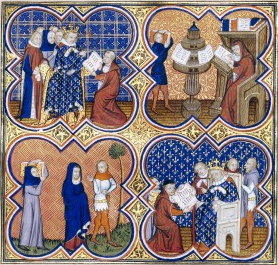The Fédération Internationale des Traducteurs is an international federation of associations of translators, interpreters and terminologists working in areas as diverse as literary, scientific and technical, public service, court and legal settings, conference interpreting, media and diplomatic fields and academia.
Interpreting is a translational activity in which one produces a first and final target-language output on the basis of a one-time exposure to an expression in a source language.
The American Translators Association (ATA) is the largest professional association of translators and interpreters in the United States with nearly 8,500 members in more than 100 countries.
The Association of Welsh Translators and Interpreters, which brands itself with its Welsh name Cymdeithas Cyfieithwyr Cymru, is a professional body representing English/Welsh translators and interpreters in Wales. The association has some 340 members, most of whom are translators; less than a quarter are interpreters. The Association of Welsh Translators and Interpreters is a member of the International Federation of Translators (FIT).
Translation studies is an academic interdiscipline dealing with the systematic study of the theory, description and application of translation, interpreting, and localization. As an interdiscipline, translation studies borrows much from the various fields of study that support translation. These include comparative literature, computer science, history, linguistics, philology, philosophy, semiotics, and terminology.
Frederik L. Schodt is an American translator, interpreter, and writer.
The National Accreditation Authority for Translators and Interpreters Ltd is the national standards and certifying body for translators and interpreters in Australia. NAATI's mission, as outlined in the NAATI Constitution, is to set and maintain high national standards in translating and interpreting to enable the existence of a pool of accredited translators and interpreters responsive to the changing needs and demography of the Australian community. The core focus of the company is issuing certification for practitioners who wish to work as translators and interpreters in Australia.
In common law jurisdictions, the generic term officer of the court is applied to all those who, in some degree in the function of their professional or similar qualifications, have a part in the legal system. Officers of the court may include entities such as judges, lawyers, and paralegals, and should not be confused with court officers, the law enforcement personnel who work in courts. In French-speaking jurisdictions, officers of the court, excluding judges, are known as auxiliaires de justice, not to be confused with judicial assistants.
A certified translation is one which fulfills the requirements in the country in question, enabling it to be used in formal procedures, with the translator accepting responsibility for its accuracy. These requirements vary widely from country to country. While some countries allow only state-appointed translators to produce such translations, others will accept those carried out by any competent bilingual individual. Between these two extremes are countries where a certified translation can be carried out by any professional translator with the correct credentials.
A language bank is an organization that helps people who need translation or interpretation services fulfill those needs through the assistance of qualified translators or interpreters. Such organizations usually, but not always, provide such services free of charge, often as a service of local government. Language banks often service immigrant or refugee communities, often in collaboration with health service providers such as the American Red Cross.
A translator or programming language processor is a computer program that converts the programming instructions written in human convenient form into machine language codes that the computers understand and process. It is a generic term that can refer to a compiler, assembler, or interpreter—anything that converts code from one computer language into another. These include translations between high-level and human-readable computer languages such as C++ and Java, intermediate-level languages such as Java bytecode, low-level languages such as the assembly language and machine code, and between similar levels of language on different computing platforms, as well as from any of these to any other of these. Software and hardware represent different levels of abstraction in computing. Software is typically written in high-level programming languages, which are easier for humans to understand and manipulate, while hardware implementations involve low-level descriptions of physical components and their interconnections. Translator computing facilitates the conversion between these abstraction levels. Overall, translator computing plays a crucial role in bridging the gap between software and hardware implementations, enabling developers to leverage the strengths of each platform and optimize performance, power efficiency, and other metrics according to the specific requirements of the application.

Translation is the communication of the meaning of a source-language text by means of an equivalent target-language text. The English language draws a terminological distinction between translating and interpreting ; under this distinction, translation can begin only after the appearance of writing within a language community.
An interpreter officer or army interpreter is a commissioned officer of an armed force, who interprets and/or translates to facilitate military operation. Interpreter officers are used extensively in multinational operations in which two or more countries that do not share a common language are undertaking a joint operation, or expeditionary missions in which the communication with the local population is crucial but limited by lack of language proficiency among the expeditionary force personnel. Interpreter officers also work in the intelligence gathering and analysis though in many countries, civilian analysts are used instead of the officers in active duty.

International Translation Day is an international day recognising translation professionals. It is celebrated every year on 30 September, which is the day of the feast of St. Jerome, the Bible translator who is considered the patron saint of translators.

The International Association of Conference Interpreters - AIIC was founded in 1953. It represents over 3,000 members present in over 100 countries.
The Allied Translator and Interpreter Section (ATIS), also known as the Allied Translator and Interpreter Service or Allied Translator and Intelligence Service, was a joint Australian/American World War II intelligence agency which served as a centralized allied intelligence unit for the translation of intercepted Japanese communications, interrogations and negotiations in the Pacific Theater of Operations between September 1942 and December 1945. During the last few months of operation ATIS primarily focused on investigation of Japanese war crimes. The section was officially disbanded on April 30, 1946.

The International Association of Professional Translators and Interpreters (IAPTI) is an international professional association of translators and interpreters based in Argentina.

The Interpreter is a 2016 Chinese television series starring Yang Mi and Huang Xuan, based on the novel Translator (翻译官) by Miao Juan. It aired on Hunan TV from 24 May to 19 June 2016. The series was the highest rated drama of the year, with an average national viewership rating of 2.63%.

The Associació Professional de Traductors i Intèrprets de Catalunya (APTIC) is an independent, non-profit association. It was officially established on January 1, 2009, and is open to all professionals from the sector who are academically trained or professionally active. APTIC is a member of the International Federation of Translators (FIT) and the Red Vértice. With over 650 members, APTIC has over twenty years’ experience representing and defending translators and interpreters. It also organizes training and promotional activities for the sector’s professionals.

Antonfrancesco Vivarelli Colonna is an Italian politician.






